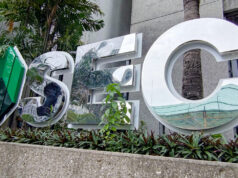COUNTERFEITING and piracy reports at the country’s intellectual property office spiked in the first half after a significant jump in reports during the lockdown.
Intellectual Property Office of the Philippines (IPOPHL) Director General Rowel S. Barba said in a speech sent to reporters on Friday that the office has received a total of 80 intellectual property (IP) rights infringement complaints and reports, or 66% more reports in the first half than full-year 2019.
The lockdown period from March to June accounted for 67 or 84% of all reports for the first half. Among these, 42% are piracy activities or the illegal distribution of copyrighted content through streaming or any other means.
“Initially, only movies were being pirated but eventually piracy of TV shows, specifically anime series, were being reported as well. [IP Rights Enforcement Office] also reported an increase of reports for e-books like educational textbooks due to the rise of distance learning,” Mr. Barba said.
The 36% consisting of counterfeiting activities include mostly apparel and accessories, and some involving cigarettes, an online beauty store, a bleach product and masks.
The remaining reports are of unauthorized selling, cybercrime, trademark registration concerns and patent infringement.
Mr. Barba said the surge in IP infringement cases during the lockdown can be attributed to either a surge in violations in the market or IP rights holders being more aggressive in exercising their rights — or both.
He warned violators may take the crisis as an opportunity to advance illicit trade given a supply and demand gap. He observed that shoppers are moving to more online shopping where they have transactions with less monitoring and more people are looking for sources of entertainment online.
“On top of all these was the fact that thousands of people are losing jobs, a sad event that continues to this today. It is not a distant possibility, then, that some of the displaced, in their desperation to secure a source of steady income, may turn to this illegal activity for livelihood,” he said.
Of the total reports for the first half, 60 have already been acted on. Consumer complaints are reported to the intellectual property right holder, while right holder reports are either given next steps or referred to the pertinent bureau outside IPOPHL.
“It is not IPOPHL who brings IP rights violators to court or files an administrative action. Under the current legal framework, an IP asset is private property so only its owner has the rightful authority to act on a violation,” Mr. Barba said.
“What we at IPOPHL do is help IP rights holders build a case to help them succeed in their enforcement, and hopefully move toward conviction, both criminal and administrative. For this, we have the Department of Justice, PNP, and NBI to help us as they are partners in the National Committee on IP Rights but more on the NCIPR later,” he added.
IPOPHL is proposing to amend its enforcement rules to be able to cover piracy and counterfeiting done online.
This will allow them to order online platforms to take down posts offering the sale of infringing products through warnings and compliance orders.
“At present what happens is that the IP rights holder is the only one who has the authority to request a take-down. Unfortunately, not all sites or platforms comply. We believe that a request from IPOPHL will compel a violator to comply,” Mr. Barba said. — Jenina P. Ibañez



